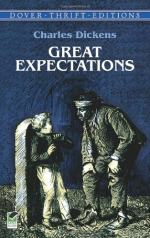|
|
Great Expectations Author/Context
One of Charles Dickens' friends, watching the author at work, described him as so: "It was interesting to watch ... the mind and muscles working (or if you please, playing) ... as new thoughts were being dropped upon the paper." Dickens, one of history's most prolific authors, is remembered as a curious picture of playfulness, energy, and stubborn will, a man given to working on three huge books at the same time and dashing off to the English countryside for twelve-mile constitutional walks. In a life that spanned fifty-eight years, Dickens wrote fifteen novels, most of which were over a thousand pages, in addition to countless novellas, stories, articles, sketches and letters. When one thinks of Dickens, as the critic Nelson Harland says, it's necessary to think big: a big life and big, big books, full of "shoals of characters, acres of plots, geysers of language."
Charles Dickens was born in 1812, in Portsmouth England. His father was eager to climb the social ladder, and to make more of his life than his parents had been able, who were illiterate servants. When Dickens' father was hired as a clerk, this shaky ascent up England's relatively hostile social ladder began. Charles' childhood was subsequently rocky--lots of moves and minor financial windfalls, followed by bad wipeouts. By the early 1820s, Charles was living with six siblings and his parents in a four-room house, with bill collectors banging at the door and no money left to send Charles to school. To help his family, Charles was sent to work in a rat-infested shoe polish factory, where he worked twelve-hour days sticking labels on pots of polish. This job seemed to scare something in the young Dickens--perhaps showing him how easily one's hopes and ambitions could be cast aside by circumstance. Things got even worse when, just a week into the factory job, his family was thrown in a debtor's prison.
As a result, Charles was determined to be more successful than his father. He taught himself shorthand as a teenager and became a court reporter, allowing him to resume his education. Soon after, some of his character sketches were accepted into monthly magazines. These were gathered later into a book, which sold well. From there, Dickens launched his lifelong career as a novelist, work that he supplemented with long hours in the theater and publication businesses. Most of his books were published serially, in magazines, during his lifetime. His more popular works include Oliver Twist (1838), A Tale of Two Cities (1859), David Copperfield (1849), Hard Times (1854), and the ever-popular story of Ebeneezer Scrooge, "A Christmas Carol" (1943). Great Expectations (1860), was also published serially but under a stricter length requirement, and is considered a more polished example of his work. It's a comparatively slim Dickens' volume, too, at just under six-hundred pages.
Charles Dickens was happy in his life, although his marriage, which lasted twenty-two years, was mutually unrewarding. By the time he wrote Great Expectations, Dickens was separated from his wife and was involved in a trying affair with a young actress. Perhaps as a consequence, the ending Dickens wrote for Pip and Estella (in which the two characters presumably never reunite) was not a happy one. But an editor convinced Dickens to change his novel's conclusion to the sunnier one which now remains. Many, like the British playwright George Bernard Shaw, were disappointed with this new ending. Shaw said of the book, "Its beginning is unhappy; its middle is unhappy; and the conventional happy ending is an outrage on it."
Charles Dickens does have his share of critics. Some say his characters are flat, his writing is moralizing, his plots arbitrary. A common criticism is that his characters are exaggerated--as the critic Angus Wilson put it, "we see them as if we've had three or four glasses of champagne". But others find the glimmering, colliding worlds of Dickens' novels delightful; there are worse things, certainly, than seeing the world through several glasses of bubbly.
Dickens died in 1870, and was laid under a tombstone that read: "England's Most Popular Author." More than a century later, his books continue to charm and engage young children, and eminent literary critics alike.
Bibliography
Bloom, Harold, ed. Modern Critical Views: Charles Dickens. New York: Chelsea House, 1987.
Dickens, Charles. Great Expectations. Great Britain: The Softback Preview, 1998.
Kappel, Lawrence, ed. Readings on Great Expectations. San Diego: Greenhaven Press, Inc., 1999.
Nelson, Harland S. Charles Dickens. New York: Twayne Publishers, 1981.




